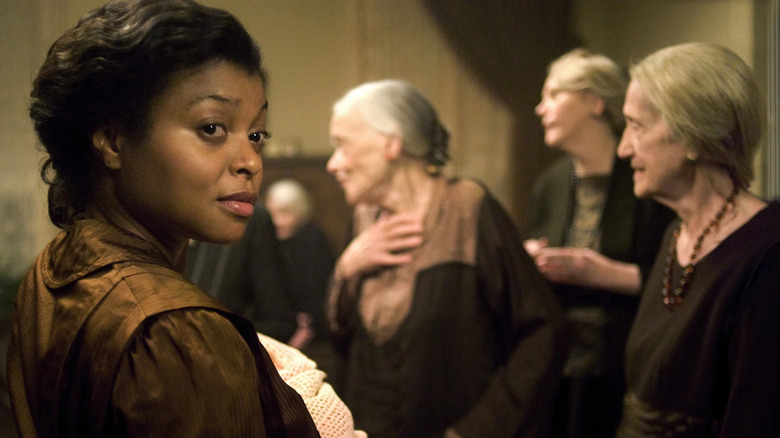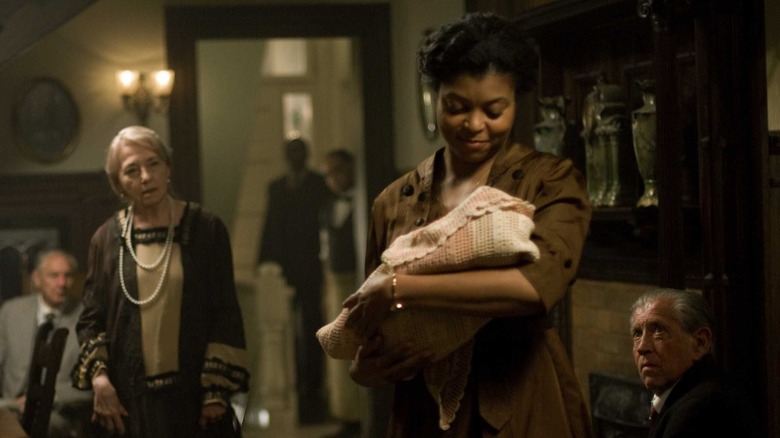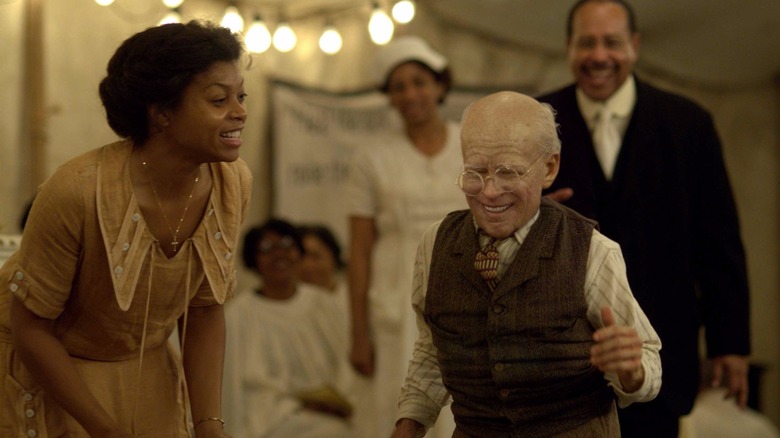The Curious Case Of Benjamin Button Was A 'Spiritual Journey' For Taraji P. Henson
In "The Curious Case of Benjamin Button," Brad Pitt's Benjamin Button and Cate Blanchett's Daisy Fuller come together and drift apart throughout, mimicking the ebb and flow of life's emotional journey. As director David Fincher explained to Emanuel Levy, "The universe conspires to make them who they are at exactly the right moment [...] And you kind of breathe a sigh of relief when they get together because now it can happen, exactly as it is supposed to." Which is strangely applicable to how "Benjamin Button" finally came to be made.
The project had been in development for decades. According to Reuters, as far back as the 1940s, William Faulkner tried his hand at adapting F. Scott Fitzgerald's short story about a man who ages in reverse, only for the project to be shelved by Jack Warner. In the '80s, former agent Ray Stark snapped up the rights to the story and took the idea to everyone from director Ron Howard to Universal Executive Josh Donen. The project continued to languish even as scripts were churned out. But once producers Kathleen Kennedy and Frank Marshall stepped in, things started to move forward. Eric Roth wrote his own version of the script while director David Fincher, who had been interested in the screenplay since it did the rounds in the early '90s, eventually got the go-ahead to make his version of the movie in 2003.
The way everything came together from there was, to use Fincher's language, almost as if the universe had conspired to make it so. After 2003, it would take some time before "Benjamin Button" started filming, owing to budgetary issues. But when shooting did get underway in late 2006, it turned out to be the ideal time for everything to "happen, exactly as it was supposed to."
'Art can be very healing'
Principal photography on "Benjamin Button" unfolded in the wake of both Fincher and Roth having suffered significant personal loss. The director's father passed away in 2003, right as he was working on a proof of concept to show Paramount how the digital aging and de-aging effects would work. Meanwhile, Roth had lost both his parents while writing the screenplay, saying, "Their deaths were obviously very painful for me, and gave me a different perspective on things."
Those events undoubtedly went a long way to infusing "Benjamin Button" with its stoic, reflective tone. But it wasn't just Fincher and Roth who were motivated by real-world loss. Taraji P. Henson, who played Queenie, Benjamin's adoptive mother, came into the film after her father passed away a year prior, and would go on a reflective journey of her own throughout the project. As the actress told Emanuel Levy:
"It's been a very spiritual journey for me. I had just lost my father, and even though I miss him dearly, it's almost as if his death was a part of my journey towards Queenie. When my father was sick, we made sure that he was never alone; someone was always at his bedside. He passed away while I was with him because he knew I could handle it. This role helped me through my grief and my grief helped shape my performance. Art can be very healing."
The poignancy of Benjamin Button
The experience of losing her father clearly had a profound effect on Henson, whose standout performance as Queenie earned her an Academy Award nomination for Best Supporting Actress. Reflecting on her experience while filming "Benjamin Button," the actress said it "forced [her] to deal with death and it gave [her] a great perspective on life and death." In that sense, it seems she was one of several collaborators on the movie who were informed by real-world pain while bringing the project to fruition.
Similarly, Fincher revealed, "I see a lot of my father in Benjamin [...] I remember him as being happy to appreciate people as they were. I filtered that in Benjamin's reactions and especially the way he dealt with people, with situations." Along with Roth's script, which was so clearly influenced by the loss of his own parents and charged with the accompanied somber, contemplative emotion, Henson's performance and Fincher's direction make for a truly affecting film.
Though some have criticized "Benjamin Button" for being overly sentimental, ultimately there was too much real emotion and experience behind the film to ever yield something genuinely maudlin or hollow. Rather, the film delivers real poignancy throughout, overcoming what could easily devolve into sappiness by not shying away from the harshness of human experience, while also managing to depict its joyful moments convincingly.
Being a part of that journey clearly had a cathartic effect on Henson, who went on to explain how she hadn't "come to grips" with the fact her father was "never coming back" when she started work on the project. Thankfully, she claimed to have found "resolve now thanks to this project."


